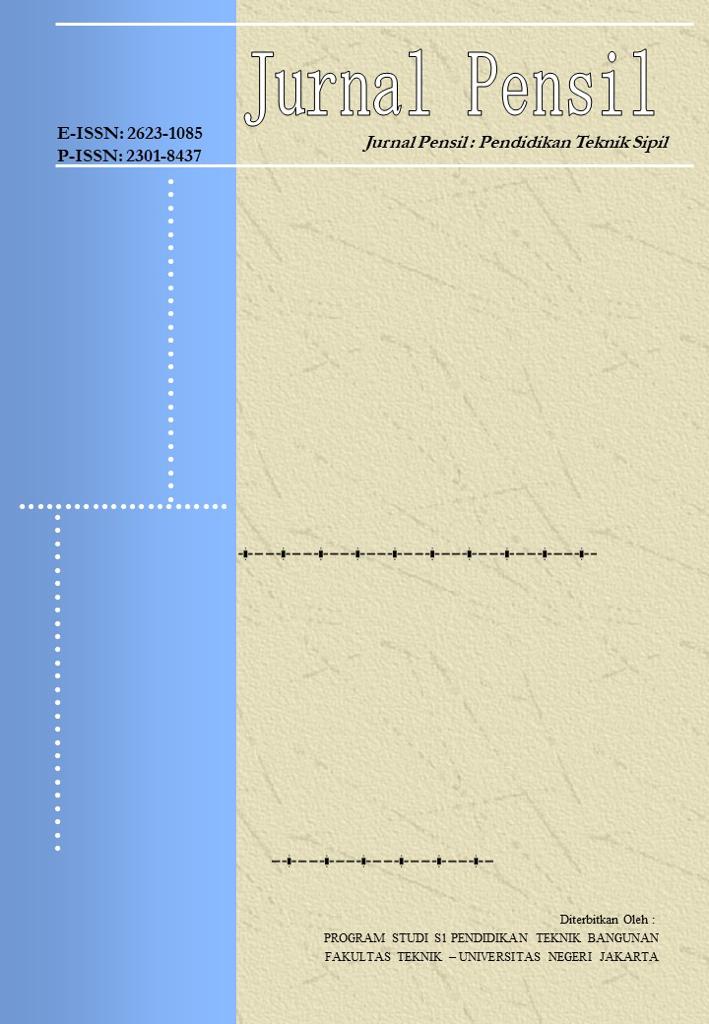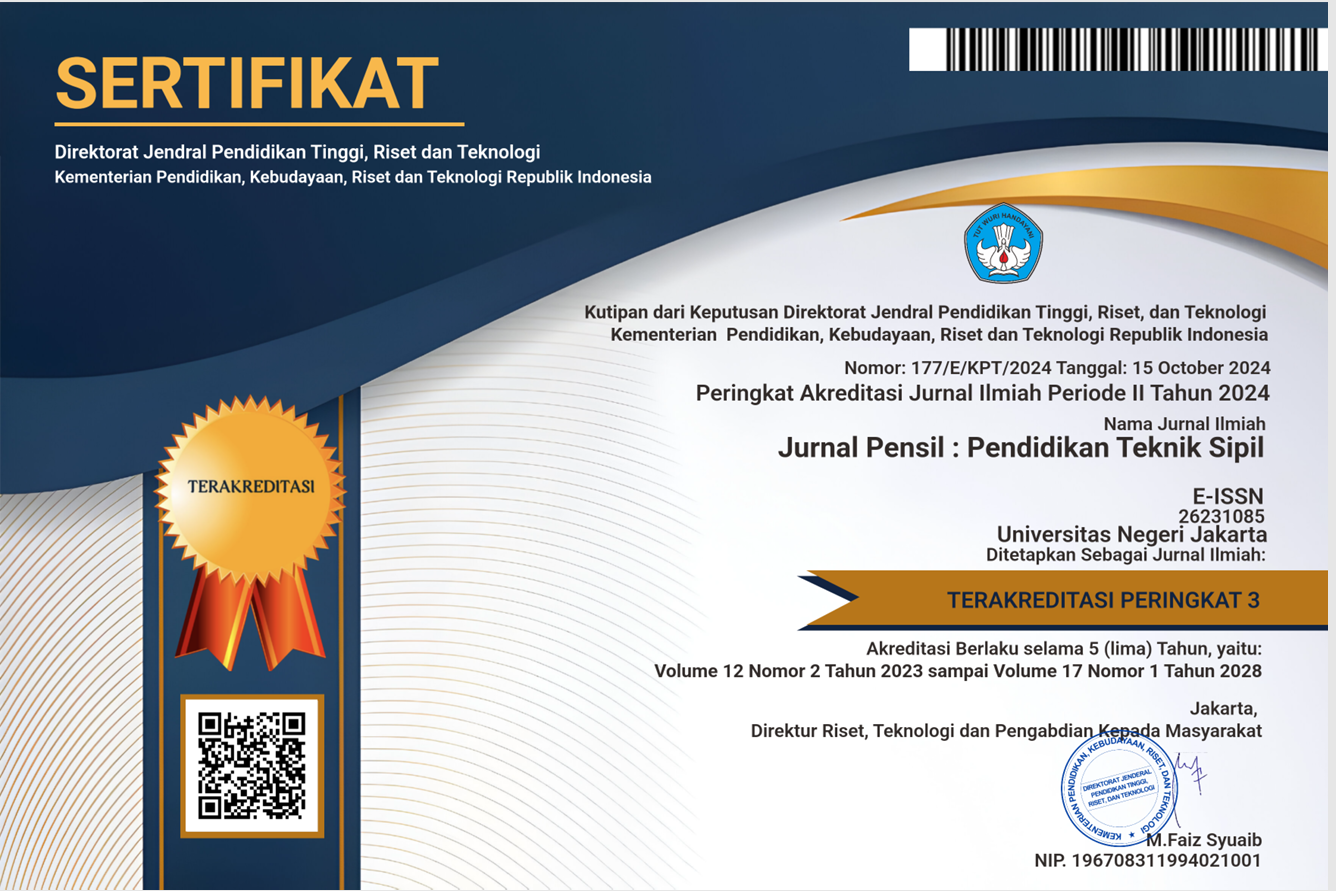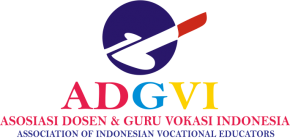ADVANCING VOCATIONAL EDUCATION WITH VOCAR-FLIP: IMPROVING STUDENT COMPREHENSION IN THE DIGITAL ERA
DOI:
https://doi.org/10.21009/jpensil.v14i1.50198Keywords:
Augmented Reality, Digital Era, Flipbook, Vocational High SchoolAbstract
In the 21st century, globalization and digital transformation have changed life patterns significantly. Digital technology is now at the center of almost all aspects of life, including the education sector in Indonesia. Technological skills and readiness to face the job market demands are critical. Vocational education, including vocational schools, aims to equip students for global market competition but continues to encounter obstacles in enhancing the quality and relevance of its programs. The proposed solution is the development of flipbook- based learning media with Augmented Reality (AR) to increase student engagement and skills in this digital era. This study employed a pre-experimental design with a one-group pretest-posttest approach, involving a population of 149 vocational school students from West Java. The research results show that using Flipbook with AR produces an N-gain score of 74.3%. With this N-gain value, the VocAR-Flip model effectively improves vocational school students' learning outcomes, especially in academic achievement and conceptual understanding. This research can contribute to developing more interactive and efficient learning technology for future education.
References
Ahmad, I., Sharma, S., Singh, R., Gehlot, A., Priyadarshi, N., & Twala, B. (2022). MOOC 5.0: A Roadmap to the Future of Learning. Sustainability (Switzerland), 14(18).
Amitkumar Dudhat, & Ardi. (2023). Application of Information Technology to Education in the Age of the Fourth Industrial Revolution. International Transactions on Education Technology (ITEE), 1(2), 131–137.
Arianti, S. F. (2024). The effectiveness of pre-tests and post-tests for teaching industrial ecology in an engineering management program. 14(6), 590–597.
Bansah, A. K., & Darko Agyei, D. (2022). Perceived convenience, usefulness, effectiveness and user acceptance of information technology: evaluating students’ experiences of a Learning Management System. Technology, Pedagogy and Education, 31(4), 431–449.
Bilgiç, S., & Aytaç, T. (2024). Evaluation of School Occupational Health and Safety Practices Performance Indicators by School Administrators. In Türk Akademik Yayınlar Dergisi (Vol. 8, Issue 2).
Bunari, B., Setiawan, J., Ma’arif, M. A., Purnamasari, R., Hadisaputra, H., & Sudirman, S. (2024). The influence of flipbook learning media, learning interest, and learning motivation on learning outcomes. Journal of Education and Learning, 18(2), 313–321.
Cao, H., Zhao, C., Zhu, J., & Mi, S. (2023). Overview of Artificial Intelligence Educational Technology. Proceedings - 2023 5th International Conference on Electronics and Communication Technologies, ECT 2023, 124 – 129.
Chiu, T. K. F. (2023). Student engagement in K-12 online learning amid COVID-19: A qualitative approach from a self-determination theory perspective. Interactive Learning Environments, 31(6), 3326–3339.
Choi, S. J., Jeong, J. C., & Kim, S. N. (2019). Impact of vocational education and training on adult skills and employment: An applied multilevel analysis. International Journal of Educational Development, 66(March), 129–138.
Diao, M., & Hedberg, J. G. (2020). Mobile and emerging learning technologies: are we ready? Educational Media International, 57(3), 233–252.
Eliyasni, R., Habibi, M., Rahmatina, & Azima, N. F. (2021). E-Module Flipbook Model for Designing E-Learning Materials in Higher Education. Proceedings of the 2nd Progress in Social Science, Humanities and Education Research Symposium (PSSHERS 2020), 563(Psshers 2020), 17–23.
Faidlatul Habibah, A., & Irwansyah, I. (2021). Era Masyarakat Informasi sebagai Dampak Media Baru. Jurnal Teknologi Dan Sistem Informasi Bisnis, 3(2), 350–363.
Fania, M., Iriani, T., & Arthur, R. (2024). Improving Vocational Student Competencies Through Industrial Class-Based Experiantial Learning. Jurnal PenSil, 13(1), 120–129.
Fasbender, U., Gerpott, F. H., & Rinker, L. (2023). Getting Ready for the Future, Is It Worth It? A Dual Pathway Model of Age and Technology Acceptance at Work. Work, Aging and Retirement, 9(4), 358–375.
Firdaus, F. M., Fadhli, R., & Abidin, Z. (2023). Promoting Collaborative Learning in Elementary Mathematics through the Use of Gamification Flipbooks: A Mixed-Methods Study. International Journal of Instruction, 16(4), 987–1008.
Fitria, T. N. (2023). Augmented Reality (AR) and Virtual Reality (VR) technology in education: Media of teaching and learning: A review. International Journal of Computer and Information System (IJCIS) Peer Reviewed-International Journal, 4(1), 14–25. https://ijcis.net/index.php/ijcis/indexJournalIJCIShomepage-https://ijcis.net/index.php/ijcis/index
Garzón, J. (2021). An overview of twenty-five years of augmented reality in education. Multimodal Technologies and Interaction, 5(7).
Huang, T., Wu, H., Yang, S., Su, B., Tang, K., Quan, Z., Zhong, W., & Luo, X. (2020). Global Trends of Researches on Sacral Fracture Surgery: A Bibliometric Study Based on VOSviewer. Spine, 45(12), E721–E728.
Indrawati, S. M., & Kuncoro, A. (2021). Improving Competitiveness Through Vocational and Higher Education: Indonesia’s Vision For Human Capital Development In 2019–2024. Bulletin of Indonesian Economic Studies, 57(1), 29–59.
Irfansyah, A., Suparji, Suprianto, B., Kuntadi, C., & Sudarmaji, H. (2023). Factors That Affect the Quality Of Vocational Education Graduates in the 4.0 Era: Job Readiness, Skills and Digital Services. Dinasti International Journal of Education Management And Social Science, 4(4), 485–496.
Ismail, A. A., & Hassan, R. (2019). Technical competencies in digital technology towards industrial revolution 4.0. Journal of Technical Education and Training, 11(3), 55–62.
Ismail, D. H., Nugroho, J., & Rohayati, T. (2023). Literature Review: Soft Skill Needed by Gen Z in the Era RI 4.0 and Society 5.0. Majalah Ilmiah Bijak, 20(1), 119–131.
Kaenong, H. A., Alexandri, M. B., & Sugandi, Y. S. (2023). Analysis Projection of the Fulfillment of Priority Facilities and Infrastructures for Vocational High School/Sekolah Menengah Kejuruan (SMK) Using System Dynamic to Increase School Participation Rates in Central Kalimantan Province, Indonesia. Sustainability (Switzerland), 15(24).
Khan, T., Johnston, K., & Ophoff, J. (2019). The Impact of an Augmented Reality Application on Learning Motivation of Students. Advances in Human-Computer Interaction, 2019.
Kovalchuk, V., Maslich, S., Tkachenko, N., Shevchuk, S., & Shchypska, T. (2022). Vocational Education in the Context of Modern Problems and Challenges. Journal of Curriculum and Teaching, 11(8), 329–338.
le Cessie, S., Goeman, J. J., & Dekkers, O. M. (2020). Who is afraid of non-normal data? Choosing between parametric and non-parametric tests. European Journal of Endocrinology, 182(2), 0–3.
Mirfani, A. M. (2019). The Challenges of Implementing ICT in the Indonesia National Education System of the Industrial Revolution Era 4.0. Journal of Physics: Conference Series, 1387(1), 0–7.
Navarro, A., Young, M., Allan, B., Carnell, P., Macreadie, P., & Ierodiaconou, D. (2020). The application of Unmanned Aerial Vehicles (UAVs) to estimate above-ground biomass of mangrove ecosystems. Remote Sensing of Environment, 242(March), 111747.
Nduwimana, S., & Sindayigaya, I. (2023). Establishing Quality in Technical and Vocational Education in Burundi: Contribution of the National Education Forum, Edition 2022 and in Employability in Burundi. Open Journal of Social Sciences, 11(09), 142–153.
Nupiah, A., McCulley, W., & He, T. (2022). The Implication of Students’ Psychological Aspects on Learning Difficulties Experienced by Students in Learning in School. Al-Hijr: Journal of Adulearn World, 1(3), 108–117.
Okoye, K., Rodriguez-Tort, J. A., Escamilla, J., & Hosseini, S. (2021). Technology-mediated teaching and learning process: A conceptual study of educators’ response amidst the Covid-19 pandemic. In Education and Information Technologies (Vol. 26, Issue 6).
Özdemir, V., Springer, S., Ylldlrlm, A., Biçer, S., Kendirci, A., Sardaş, S., Klllç, H., Hekim, N., Kunej, T., Arga, K. Y., Dzobo, K., Wang, W., Geanta, M., Brand, A., & Bayram, M. (2021). Thanatechnology and the Living Dead: New Concepts in Digital Transformation and Human-Computer Interaction. OMICS A Journal of Integrative Biology, 25(7), 401–407.
P. Oronce, J., & O. Manalo, D. A. (2021). Development and Validation of Flipbook in Earth and Life Science. International Multidisciplinary Research Journal, 3(1), 111–117.
Perdana, R. M. (2021). Analysis of Theory of Planned Behavior (TPB) in Disobedience Behavior towards Occupational Health and Safety (K3). Journal of Economics, Business, and Government Challenges, 4(02), 140–148.
Piwowar-Sulej, K. (2021). Human resources development as an element of sustainable HRM – with the focus on production engineers. Journal of Cleaner Production, 278, 124008.
Plekhanov, D., Franke, H., & Netland, T. H. (2023). Digital transformation: A review and research agenda. European Management Journal, 41(6), 821–844.
Popov, A. (2023). The future of work: Adapting to technological disruptions in the labor market. Journal of Philosophical Criticism, 0(02), 199–217.
Prasetya, F., Fortuna, A., Samala, A. D., Rawas, S., Mystakidis, S., Syahril, Waskito, Primawati, Wulansari, R. E., & Kassymova, G. K. (2024). The impact of augmented reality learning experiences based on the motivational design model: A meta-analysis. Social Sciences & Humanities Open, 10, 100926.
Pratama, R. A., Saputra, M. A., Pratiwi, I. M., & Lestari, N. I. (2022). Student Teachers’s Readiness to Face Society 5.0 Challenges: Are They Ready to Teach with Competencies Needed? Proceedings of the Universitas Lampung International Conference on Social Sciences (ULICoSS 2021), 628(ULICoSS 2021), 470–476.
Putri, Y. E., Akmal, N., Elfita, A., & Anugerah, A. I. (2024). Development of E-Modules in Sanitation Hygiene and K3 Courses in the Culinary Study Program. Ictvet 2023, 22–29.
Rachmadtullah, R., Zulela, M. S., & Syarif Sumantri, M. (2019). Computer-based interactive multimedia: A study on the effectiveness of integrative thematic learning in elementary schools. Journal of Physics: Conference Series, 1175(1).
Radu, I., Huang, X., Kestin, G., & Schneider, B. (2023). How augmented reality influences student learning and inquiry styles: A study of 1-1 physics remote AR tutoring. Computers & Education: X Reality, 2, 100011.
Rahayu, S., Meirawan, D., Muktiarni, M., Ghinaya, Z., & Sabitri, Z. (2024). Analyzing Transferable Skills of Vocational Students To Align With Industry Demands. Jurnal PenSil, 13(1), 34–46.
Rahmawati, S., & Nurachadija, K. (2023). Inovasi Pendidikan Dalam Meningkatkan Strategi Mutu Pendidikan. BERSATU: Jurnal Pendidikan Bhinneka Tunggal Ika, 1(5), 1–12. https://doi.org/10.51903/bersatu.v1i5.303
Rizbudiani, A. D., & Jaedun, A. (2021). Occupational Health and Safety Management System (SMK3) at the workshop of vocational high schools. Jurnal Pendidikan Vokasi, 11(2), 326–336.
Roemintoyo, R., & Budiarto, M. K. (2021). Flipbook as Innovation of Digital Learning Media: Preparing Education for Facing and Facilitating 21st Century Learning. Journal of Education Technology, 5(1), 8.
Saari, A., Rasul, M. S., Yasin, R. M., Rauf, R. A. A., Ashari, Z. H. M., & Pranita, D. (2021). Skills sets for workforce in the 4th industrial revolution: Expectation from authorities and industrial players. Journal of Technical Education and Training, 13(2), 1–9.
Sabitri, Z., Meirawan, D., & Rahayu, S. (2024). Enhancing Vocational Students ’ Critical Thinking Skills in Society 5 . 0 with Flipbook and Augmented Reality Learning Media. 24(1), 31–42.
Sabitri, Z., Rahayu, S., & Meirawan, D. (2024). The implementation of augmented reality-based flipbook learning media in improving vocational school students’ critical thinking skills in the era of society 5.0. Jurnal Pendidikan Teknologi Kejuruan, 7(1), 22–31.
Santika, A., Simanjuntak, E. R., Amalia, R., & Kurniasari, S. R. (2023). Peran pendidikan sekolah menengah kejuruan dalam memposisikan lulusan siswanya mencari pekerjaan 1.2.3.4. Jurnal Kajian, Penelitian Dan Pengembangan Kependidikan, 14(1), 84–94.
Sanusi, F. M., Rompas, P. T. D., & Oroh, R. R. (2023). Implementation of the Occupational Safety and Health Management System in the Automotive Light Vehicle Engineering Workshop of Cokroaminoto Vocational School, Kotamobagu. International Journal of Information Technology and Education, 2(4), 122–141.
Setiyani, N., & Purwati, P. D. (2025). DEVELOPING KEMUKUS MOUNTAIN FLIPBOOK INTEGRATED WITH Ta RL APPROACH IN IMPROVING STUDENTS ’ COMPREHENSION OF DESCRIPTIVE TEXTS. 13(1), 281–293.
Sumi, R. S., & Kabir, G. (2021). Satisfaction of e-learners with electronic learning service quality using the servqual model. Journal of Open Innovation: Technology, Market, and Complexity, 7(4), 227.
Trenerry, B., Chng, S., Wang, Y., Suhaila, Z. S., Lim, S. S., Lu, H. Y., & Oh, P. H. (2021). Preparing Workplaces for Digital Transformation: An Integrative Review and Framework of Multi-Level Factors. Frontiers in Psychology, 12(March), 1–24.
Wahyu Widodo, A., Solikhatun, I., Raharja, S., Abdun Salam, A., & Sri Wartini, F. (2021). A Utilization of Information Technology on Education in Indonesia (2017-2020): A Systematic Literature Review. Journal of Physics: Conference Series, 1779(1).
Wijanarka, B. S., Sukardi, T., Rahdiyanta, D., & Ngadiyono, Y. (2019). Evaluation of implementation of health and safety in industry and vocational school in Yogyakarta Special Region. Journal of Physics: Conference Series, 1273(1), 0–7.
Wijaya, R., Sudaji, E., & Febrianto, I. (2024). Game-Based Learning for Entrepreneurship in Vocational Education to Face 4 . 0 Industry Revolution. 1, 1–9.
Ye, J. H., He, Z., Bai, B., & Wu, Y. F. (2024). Sustainability of Technical and Vocational Education and Training (TVET) along with Vocational Psychology. Behavioral Sciences, 14(10).
Yelianti, U., Anggereini, E., & Irfan, M. K. (2020). Developing Electronic Learning Media Using 3d Pageflip on the Material of Classification of Living Thingsfor the 7th Grade Students of Junior High School. Journal of Physics: Conference Series, 1464(1).
Yosintha, R., Rekha, A., Nugrahaeni, D. A., & Maulani, F. (2024). Developing A Flipbook for Introduction to English Grammar Course with Project-Based Learning Approach. Langkawi: Journal of The Association for Arabic and English, 10(1), 66.
Zulfiqar, F., Raza, R., Khan, M. O., Arif, M., Alvi, A., & Alam, T. (2023). Augmented Reality and its Applications in Education: A Systematic Survey. IEEE Access, 11(December), 143250–143271.
Downloads
Published
How to Cite
Issue
Section
License
Copyright (c) 2025 Zenita Sabitri, Asri Wibawa Sakti, Sri Rahayu, Muktiarni, Zahra Ghinaya

This work is licensed under a Creative Commons Attribution-ShareAlike 4.0 International License.











.png)
.png)
1.png)

